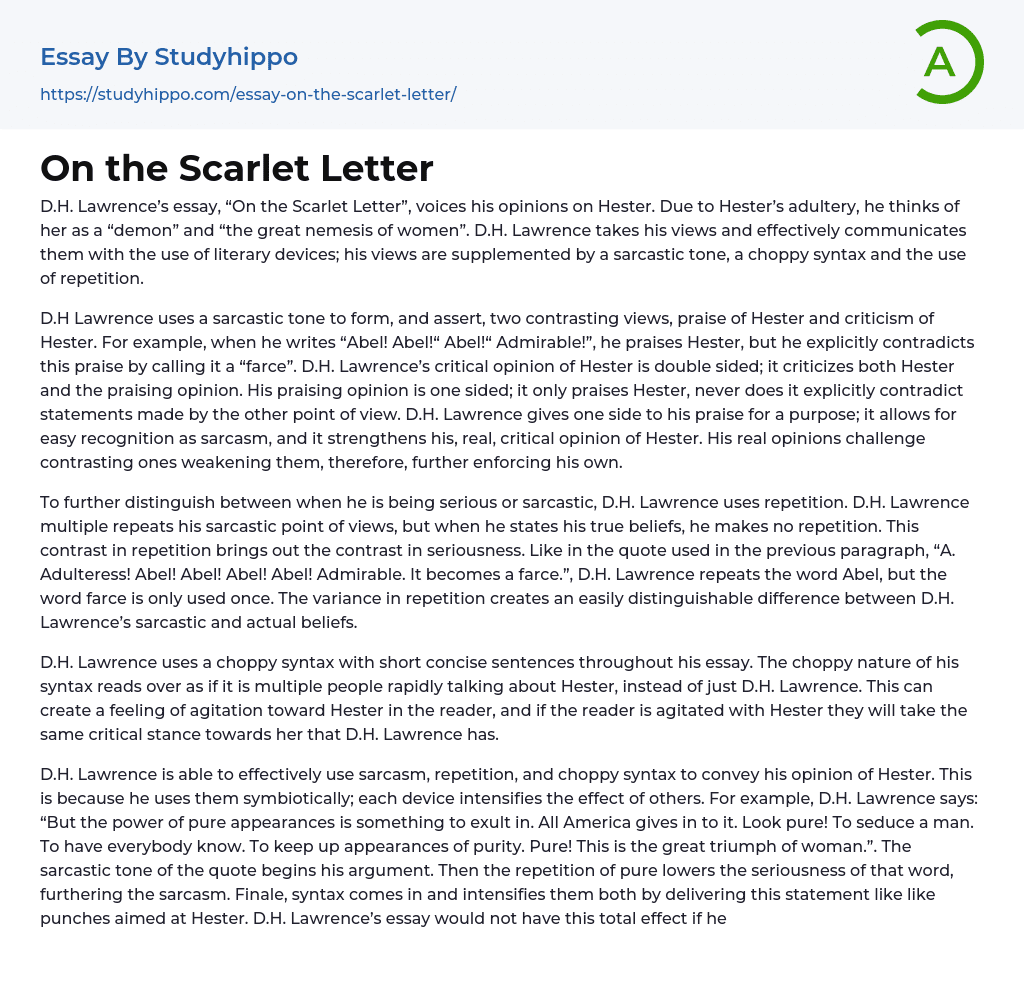Through his critique "On the Scarlet Letter", D.H. Lawrence vividly portrays his perspective on Hester. He perceives her, stemming from her act of adultery, as a "demon" and perceives her as "the great nemesis of women". His viewpoints are conveyed effectively through the use of literary tools such as sarcasm, fragmented sentence structure, and repetition.
D.H Lawrence skilfully employs a sarcastic tone to present, and defend, two opposing perspectives, the admiration of Hester and the condemnation of Hester. For instance, when he composes “Abel! Abel! "Abel!" Admirable!”, he is ostensibly lauding Hester, although he openly negates this commendation by describing it as a ‘farce’. D.H. Lawrence’s critique of Hester is two-fold; it rebukes both Hester and the complimentary viewpoint. His approbation is single faceted; it purely lauds Hester, never openly negating assertions expressed by the contrasting point of view. D.H. Lawrence offers one dim
...ension to his laudation with purpose; it abets easy identification as sarcasm, and it fortifies his, genuine, judgement of Hester. His authentic beliefs challenge contrasting ones thereby undermining them, thus, amplifying his own.
D.H. Lawrence skillfully employs repetition to differentiate between his moments of sincerity and instances of sarcasm. Often, he reiterates his sarcastic observations several times, but refrains from doing so when expressing his authentic views. This deliberate distinction in repetition underscores the striking contrast between seriousness and mockery. For example, within the citation from the previous paragraph, he repeatedly utters 'Abel' but only mentions 'farce' once: “A. Adulteress! Abel! Abel! Abel! Abel! Admirable. It becomes a farce.” This varying use of repetition helps elucidate the line dividing Lawrence's sarcastic comments from his genuine beliefs.
In his essay, D.H. Lawrence employs a fragmented syntax
comprising succinct sentences. The disjointed or abrupt style of his syntax seems as though multiple individuals are hastily discussing Hester rather than it being just Lawrence. This can stimulate a sense of annoyance towards Hether for the reader, and when the reader is irritated with Hether, they will most likely adopt D.H. Lawrence's critical viewpoint.
D.H. Lawrence employs effective tools such as sarcasm, repetition, and disjointed syntax to deliver his perspective on Hester. This is due to his symbiotic use of these devices; each one amplifies the impact of the others. Consider D.H. Lawrence's statement: “But the power of pure appearances is something to exult in. All America gives in to it. Look pure! To seduce a man. To have everybody know. To keep up appearances of purity. Pure! This is the great triumph of woman.”. His sarcastic tone initiates the argument. Next, the repeated use of 'pure' diminishes the gravity of that term, augmenting the sarcasm. Finally, the syntax swings into action and strengthens both by hurling this declaration like targeted punches at Hester. D.H. Lawrence's essay wouldn't capture this whole effect if he chose to omit any of these three devices.
- Book Summary essays
- Metaphor essays
- Reader essays
- Rhyme essays
- Literary devices essays
- Villain essays
- Books essays
- Genre essays
- Literary Criticism essays
- Writer essays
- Protagonist essays
- Simile essays
- Poem essays
- Book Report essays
- Book Review essays
- Greek Mythology essays
- Plot essays
- Tragic Hero essays
- Coming of Age essays
- Play essays
- Rhetoric essays
- Rhetorical Question essays
- Translation essays
- Understanding essays
- Reason essays
- Character essays
- Letter essays
- American Literature essays
- Literature Review essays
- Utopia essays
- Poetry Analysis essays
- Dante's Inferno essays
- Between The World and Me essays
- Incidents in The Life of a Slave Girl essays
- Flowers for Algernon essays
- Myth essays
- Everyday Use essays
- Boo Radley essays
- Genesis essays
- Richard iii essays
- Alice in Wonderland essays
- On the road essays
- Ozymandias essays
- The Nightingale essays
- Holden Caulfield essays
- Animal Farm essays
- 1984 essays
- A Hanging essays
- Shooting An Elephant essays
- A Tale Of Two Cities essays




